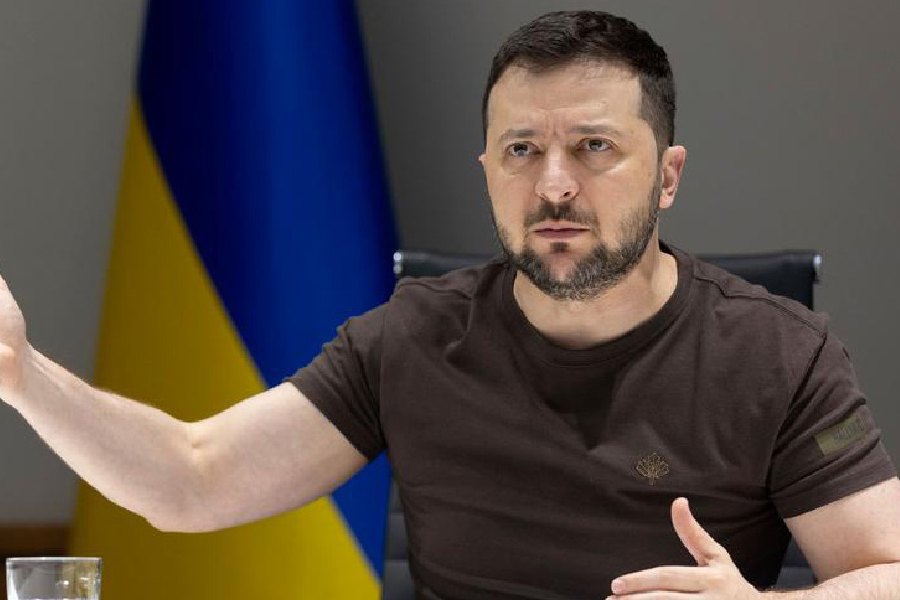Ukrainian President Volodymyr Zelensky said it would be "absurd" if NATO leaders gathering on Tuesday did not offer his country a timeframe for membership and suggested the military alliance was not ready to open its doors to Ukraine.
Zelensky's salvo at the start of a summit came after NATO chief Jens Stoltenberg said the bloc would send Kyiv a "positive message" on its path to membership, though diplomats said the exact wording was yet to be determined and could contain riders.
It highlighted the divisions among NATO's 31 members over giving a date or a straightforward invitation for Ukraine to join. Kyiv has been pushing for a swift entry, bound together with security guarantees, since even before Russia unleashed its invasion in February 2022.
Secretary General Stoltenberg said Kyiv would get more military aid and security guarantees, an easing of formal conditions to join, as well as a new format of cooperation with the alliance, the so-called NATO-Ukraine Council.
"I expect allies will send a clear, united and positive message on the path towards membership for Ukraine," Stoltenberg said.
Zelensky, however, spoke against what he saw as weak wording around Ukraine's bid for NATO membership.
"It's unprecedented and absurd when a timeframe is not set, neither for the invitation nor for Ukraine's membership," he said before landing at the meeting as a special guest.
The summit, in the Lithuanian capital Vilnius, is taking place as Ukraine's long-awaited counteroffensive, which began last month, proceeds more slowly than Kyiv had hoped against the heavily dug-in Russian positions.
Zelensky did however score wins elsewhere. French President Emmanuel Macron said Paris would start supplying long-range cruise missiles, following a similar announcement by Britain.
With a range of 250 km (155 miles), the missiles nearly triple Ukraine's previous capabilities, allowing forces to hit Russian troops and supplies deep behind the front lines.
A French military source dismissed suggestions that the missiles were an escalation, saying their use was proportional and noting that Russia was using cruise missiles launched from thousands of kilometres away.
"It rebalances things and enables Ukraine to hit deep into Russian lines and can penetrate tougher targets," he said.
Germany, too, announced new aid worth 700 million euros, including two Patriot air defence missile launchers, and more tanks and fighting vehicles.
The summit was also buoyed by the prospect of Sweden joining NATO as its newest member after Turkish President Tayyip Erdogan on Monday abruptly dropped his objections to the move, while pushing to revive talks for Turkey to join the European Union.
Finland attended the summit as a member for the first time after its own entry into the alliance in April.
While NATO members agree Kyiv cannot join during the war, they have disagreed over how quickly it could happen afterwards and under what conditions.
NATO members in eastern Europe have backed Kyiv's stance, arguing that bringing Ukraine under NATO's collective security umbrella is the best way to deter Russia from attacking again.
Countries such as the United States and Germany have been more cautious, wary of any move that they fear could draw NATO into a direct conflict with Russia.
Diplomats said the text of the final agreement of the summit may raise the prospect of the alliance being in a position to "extend an invitation" to Kyiv to join "when allies agree and conditions are met".
Officials said that might leave out specifying what those conditions would be. They stressed the draft agreement had not yet been finalised.
U.S. President Joe Biden gave his backing to Stoltenberg's choice of language around Ukraine's membership, stressing that NATO needed to stay united against the attempts of Russian President Vladimir Putin to split the alliance.
"I still think that President Putin thinks the way he succeeds is to break NATO and we're not going to do that," Biden said.
The summit is also set to approve NATO's first comprehensive plans since the end of the Cold War to defend against any attack from Russia.
Moscow, which has cited NATO's eastern expansion as a key factor in its decision to invade Ukraine, has criticised the two-day summit and warned Europe would be the first to face "catastrophic consequences" should the war in Ukraine escalate.
"Potentially, this issue (of Ukraine joining NATO) is very dangerous for European security... and therefore those who will make the decision must be aware of this," said Kremlin spokesperson Dmitry Peskov.
European leaders did not seem to understand that moving NATO military infrastructure towards Russia's borders was a mistake, he said.
Russia's invasion of Ukraine was what prompted Sweden - and its Nordic neighbour Finland - to abandon decades of military non-alignment and apply to join NATO.
Finland became NATO's 31st member but Sweden's accession has been held up by a dispute with Turkey, where Erdogan had accused Sweden of not doing enough to crack down on militants that Ankara sees as terrorists.
Swedish Prime Minister Ulf Kristersson and Erdogan agreed to step up cooperation on fighting terrorism.
The United States also promised to move forward with the transfer of F-16 fighter jets to Turkey, National Security Advisor Jake Sullivan said.











